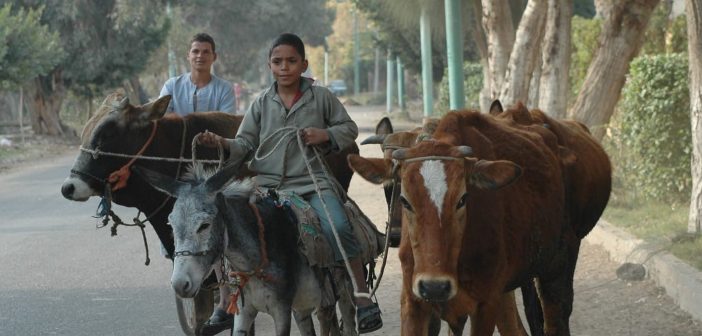(Featured image: boys with donkey and cows in Egypt. Credit Kim Bartlett – Animal People, Inc.)
Animal Welfare in Islamic Law
الرفق بالحيوان في شريعة الإسلام
Download in English – تحميل باللغة العربية
Introduction by Author, Dr. Kristen Stilt:
In my studies of Islamic law, I have always been impressed by the extensive rules that require humans to treat animals kindly and with mercy. These rules are wide ranging, and include significant protections for work animals like horses and donkeys, requirements that slaughtering be done in the absolutely merciful way as possible, and commands to treat dogs and cats kindly in all situations. The position on animal welfare within Islamic law is an excellent example of compassion and concern for those who depend on others for their care. Islamic legal protection of animal welfare is truly a model for everyone, and if these protective rules were applied world wide, the amount of animal suffering would be radically reduced and the situation for animals would be tremendously better.
With these incredibly strong protections for animals in Islamic law, however, I am dismayed to see the rejection and negligence of these rules on the streets of Cairo today. It has become normal to see young boys running after a small dog or pitiful cat and throwing rocks at the poor creatures, or tying up the puppy and dragging him by the rope. They may even continue with this torture until they kill the animal. It is even more common to see an emaciated donkey (or mule or horse) pulling a heavy cart through the streets of Cairo, and the driver of the cart has whipped the donkey so badly that he has bleeding sores. If you asked the children who are torturing the dog why they are doing it, sometimes they even say that Islam requires this cruelty to dogs. Likewise, the driver of the cart believes that because he owns the donkey (or mule or horse), he is permitted to do what he wants with his property. He is not concerned that the donkey will suffer, drop from the weight of the burden, or even die from this treatment.
I fear that the Islamic rules requiring kindness to animals are being neglected and forgotten. I have noticed, for example, that no one will try to exhort the driver of the cart to lighten the load or to stop beating the donkey, because people have gotten used to this kind of behavior. It takes so little to avoid cruelty, and so the cruelty is even more tragic. When foreigners visit Cairo and see these actions, they think, unfortunately, that cruelty to animals is allowed—or worse, required—by Islamic law.
I wrote this booklet for two reasons. First, I want to show the amazing range of animal welfare and protection that is required by Islamic law. Despite all of the attention on Islam and Islamic law throughout the world in recent years, the area of animal welfare has been completely missing in discussions about Islamic law. The rules of Islamic law on animal welfare, established in the seventh century, do more to protect animals than the laws of any country today. Second, through this booklet I ask Egyptians and Muslims generally to follow the wonderful rules of animal welfare that the religion requires, and thereby lead us all to a kinder and safer place for animals world wide. The field of animal welfare desperately needs positive examples and leaders, and I invite Muslims to be the example for everyone else to follow.
__





